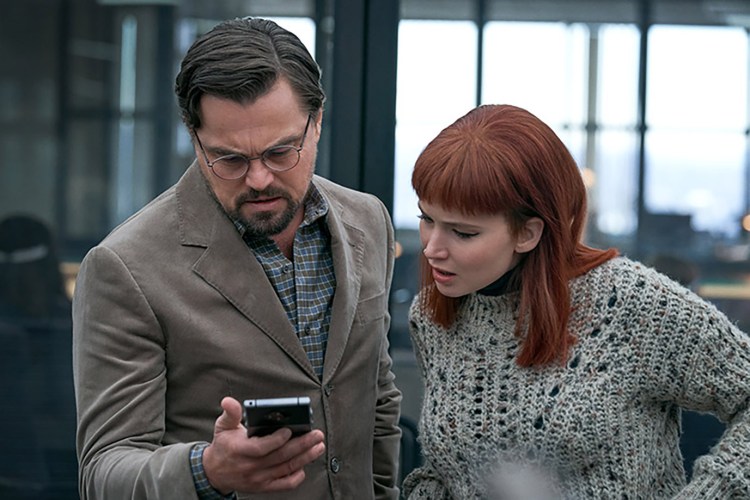“Don’t Look Up” exemplifies a vanishing breed in mainstream cinema: the Great American One-Off, a movie designed not as a sequel, brand-extender or franchise-builder (or launchpad for same), but as something simply to be enjoyed in one sitting – full stop, with no lifetime multiversal obligations attached.
For that alone, writer-director Adam McKay should be commended. With such past films as “Step Brothers” and “Talladega Nights: The Ballad of Ricky Bobby” and, more recently the fact-based dramedies “The Big Short” and “Vice,” McKay has proved adept at a form that, in an age of binge-streaming and never-ending sagas, feels as archaic as a Charlie Chaplin one-reeler. With “Don’t Look Up,” McKay is excavating an even rarer resource within that long-buried vein, creating a political satire that invites comparison to such canonical classics as “Dr. Strangelove, Or: How I Learned to Stop Worrying and Love the Bomb,” “Wag the Dog” and “Idiocracy.”
“Don’t Look Up” might be too shaggy, and tonally spotty, to gain immediate access to that pantheon. But it comes bracingly close. As the film opens, a bored graduate student in astronomy named Kate Dibiasky (Jennifer Lawrence) is roused from her torpor by the sight of a comet on her computer screen. A few moments later, she discovers that its trajectory is headed straight toward Earth. Her adviser, Randall Mindy (Leonardo DiCaprio), confirms her suspicions. After a panicked call to NASA, Kate and Randall are on their way to Washington, where they will need to convince President Janie Orlean (Meryl Streep) that the extinction-level event due to arrive in six months might be worth her attention.
Based on a story McKay co-wrote with David Sirota, “Don’t Look Up” bristles with the combustible elements of absurdity, observational humor and seething outrage that give the best political satires their edge: Here, the comet is a fitting metaphor for climate change, the COVID pandemic or any number of threats that, because of hyperpolarization and a dumbed-down populace, alarming numbers of Americans choose to ignore. President Orlean’s political affiliation is never explicitly stated, but her signature gimme cap and son-slash-chief of staff (played with bratty bro-tastic contempt by Jonah Hill) bear the unmistakable whiff of The Former Guy. Still, “Don’t Look Up” is less interested in shooting fish in a partisan barrel than exploring the vagaries of human nature – at their most infuriating, inexplicable and, sometimes, disarmingly endearing.
DiCaprio, his leading-man features hidden behind a frumpy beard and nerdy glasses, completely disappears into his role as a distracted academic who is wholly unprepared for the media firestorm he ignites, and in which he’s forced to navigate sudden, Fauci-level fame. Lawrence’s hair and makeup aren’t nearly as convincing (her severe red bangs and nose piercings are particularly distracting), but she reminds viewers of her gift for comic timing, such as when she expertly cadges a Xanax from her nervous colleague outside the Oval Office. Streep plays Orlean as a cigarette-sneaking cipher, who winds up leveraging Randall and Kate’s warning for her own interests. Less successful is Mark Rylance as a strange tech titan named Peter Isherwell, an eminence grise of prominent white teeth, Julian Assange-like hair and irritatingly gnomic pronouncements.
The Isherwell segments of “Don’t Look Up” grow as tiresome as the character himself and, at over two hours, the movie often feels unnecessarily padded. But when it’s on-pace, it feels absolutely on point in an era awash in mutual mistrust and willed disbelief, which McKay conjures with withering accuracy in amusing set pieces and choice one-liners. (“We’re for the jobs the comet will create,” Kate’s parents say apologetically when she seeks solace in her hometown.)
Indeed, “Don’t Look Up” may be less a political satire than a sociocultural one: A subplot featuring a celebrity couple played by Ariana Grande and Kid Cudi, culminating in a hilariously over-the-top benefit concert, attains the Platonic ideal of parody at which a scene feels surreal and all too accurate at the same time.
Delivering swift, stinging kicks to everything from anti-intellectualism to the excesses of celebrity culture, social media and infotainment-ized news, “Don’t Look Up” eventually goes deeper than cheap and easy snark. As the movie wends its way to what becomes its depressingly obvious conclusion, McKay finds room for unexpected humanism and generosity. When Kate meets a skateboarder named Yule (Timothée Chalamet), the two embark on a friendship that punctuates the film with genuine sweetness – especially during an unexpectedly tender concluding scene.
Not content with simply stoking rage and self-righteous superiority, McKay dares to infuse “Don’t Look Up” with an authentic, unironic sense of grief. Sincerity might be the most daring move of all in a film that, at its angriest and most amusing, doesn’t mind tacking perilously close to real life.
Send questions/comments to the editors.



